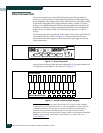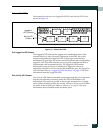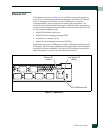
McDATA 4416 Fibre Channel Switch Module Installation Guide
2-4
Performance
Performance
The switch module supports class 2 and class 3 Fibre Channel service with a
maximum frame size of 2148 bytes at transmission rates of 1-Gbps, 2-Gbps, or
4-Gbps. An external port adapts its transmission speed to match that of the
device to which it is connected prior to login when the connected device
powers up. Related performance characteristics include the following:
• Distance
• Bandwidth
• Latency
Distance
Consider the physical distribution of devices and switches in the fabric.
Choose SFP transceivers that are compatible with the cable type, distance,
Fibre Channel revision level, and the device host bus adapter. Refer to
Specifications for more information about cable types and transceivers.
Each Fibre Channel port is supported by a data buffer with a 16 credit
capacity; that is, 16 maximum sized frames. For fibre optic cables, this enables
full bandwidth over the following approximate distances:
• 26 kilometers at 1-Gbps (0.6 credits/Km)
• 13 kilometers at 2-Gbps (1.2 credits/Km)
• 6 kilometers at 4-Gbps (2.4 credits/Km)
Beyond these distances, however, there is some loss of efficiency because the
transmitting port must wait for an acknowledgement before sending the next
frame.
Longer distances can be spanned at full bandwidth by extending credits to
G_Ports, F_Ports, and E_Ports. Each port can donate 15 credits to a pool from
which a recipient port can borrow. The recipient port also loses a credit in the
process. For example, you can configure a recipient port to borrow 15 credits
from one donor port for a total of 30 credits (15+15=30). This will support
communication over the following approximate distances:
• 50 Km at 1-Gbps (30÷0.6)
• 25 Km at 2-Gbps (30÷1.2)
• 12 Km at 4-Gbps (30÷2.4)
You can configure recipient and donor ports using the Set Config command.
Refer to the McDATA 4416 Command Line Interface Guide for information about
the Set Config command.


















